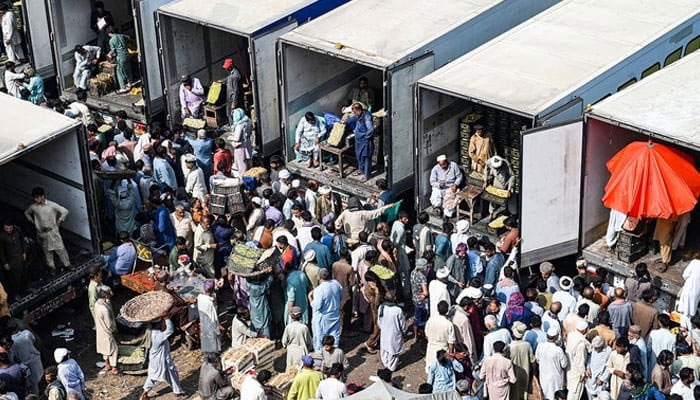Global compliance issues
LAHORE: Pakistani planners are so occupied with keeping the current economy afloat that they have ignored some of the burning issues at the global front, like supply chain efficiency, circularity and sustainability, all of which are crucial to conducting international trade.
Global buyers not only look for the best quality at the most competitive rates but also consider the way suppliers treat their workers. Besides living wages, they desire the suppliers to establish fair-priced shops, subsidized lunch and dinner, well-maintained toilets in sufficient numbers, and daycare centres for the children of women employees. Suppliers with tainted human rights records are banned by buyers. Consumers in developed economies also prefer goods made by ethical suppliers only.
Climate change is a hot topic throughout the world. Pakistan is among the countries that have been severely impacted by climate change. Flash floods and unusual rains are the outcomes of climate change. There is a dire need to reduce air and water pollution.
This pollution is worst in Pakistan, and its major cities, which are also its industrial hubs, are among the most polluted cities in the world. In fact, the inhabitants of polluted urban centres rarely see a clear blue sky because of the smoke emitted by vehicular traffic and smoke-emitting industries. Water channels throughout the country are flooded with poisonous chemicals thrown directly into freshwater streams by factories, as most of them have not installed water treatment plants. Tanneries, textile processors, carpet manufacturers and many apparel producers are major industrial polluters in Pakistan.
The world is rapidly recycling all textile products for reuse to produce new apparel. Some major global brands are set to achieve a ratio of 50 per cent recycled and 50 per cent fresh fibre in their products by 2030. This is also the deadline set by the European Union for all textiles that would be permitted inside the EU. The US, Canada and Australia are also taking measures to fix limits up to which new fibre would be allowed to be used in textile products.
Other countries in the region have prepared themselves for the challenge. But this concept in Pakistan is limited to a few apparel exporters, mostly in the denim sector. Bigger brands could leave Pakistan in the next five years if the industry at large fail to keep up with global trends.
The textile sector’s value chain in Pakistan is not fully developed. Baring cotton and polyester, all accessories like buttons, badges, zips, and others have to be imported. It is the same in other industries like automobiles. Our industries faced supply constraints during the Covid-19 crisis, and many of the orders could not be executed.
All these issues are related to the private sector but need handholding by the state as commissioning water treatment plants, for instance, requires huge investment. The state could commission common effluent water treatment plants at industrial hubs and take usage rent from each industry.
But no such plant is in the pipeline. The establishment of accessory units needs joint ventures under the patronage of the state. Plus, the state has to revamp its regulatory bodies to ensure that all issues related to human rights and worker compliance are fully resolved in all industries.
-
 Real Reason Why 'Only Murders In The Building' Cast Didn't Attend 2026 Actor Awards
Real Reason Why 'Only Murders In The Building' Cast Didn't Attend 2026 Actor Awards -
 Prince William Makes Big Decision After Princess Eugenie, Beatrice Ban
Prince William Makes Big Decision After Princess Eugenie, Beatrice Ban -
 GLP-1 Drugs Linked To Osteoporosis And Gout: New Study Reveals Higher Risks
GLP-1 Drugs Linked To Osteoporosis And Gout: New Study Reveals Higher Risks -
 Seth Rogen Unveils Catherine O’Hara's Distinguished Quality In Emotional Tribute
Seth Rogen Unveils Catherine O’Hara's Distinguished Quality In Emotional Tribute -
 MWC 2026: New Smartphones, AI Gadgets And Tech Innovations Revealed
MWC 2026: New Smartphones, AI Gadgets And Tech Innovations Revealed -
 King Offers Harry, Meghan Markle A 30 Bedroom Lodge Despite Its Decades Of Baggage: ‘it’s An Olive Branch’
King Offers Harry, Meghan Markle A 30 Bedroom Lodge Despite Its Decades Of Baggage: ‘it’s An Olive Branch’ -
 Selma Blair Talks About How Her Debilitating Disease Is 'misunderstood'
Selma Blair Talks About How Her Debilitating Disease Is 'misunderstood' -
 China’s 5-year Tech Strategy: What To Expect At Annual Parliament Meeting Amid Rivalry With West
China’s 5-year Tech Strategy: What To Expect At Annual Parliament Meeting Amid Rivalry With West -
 Andrew’s Total Meltdown On The Day Of Eviction: Insider Breaks It Down Word For Word
Andrew’s Total Meltdown On The Day Of Eviction: Insider Breaks It Down Word For Word -
 Michael J. Fox Stuns Actor Awards Audience With Rare Confession Amid Parkinson's Disease
Michael J. Fox Stuns Actor Awards Audience With Rare Confession Amid Parkinson's Disease -
 Beatrice’s In-laws Stand Against Her Marriage: ‘Furious Their Son Is Wrapped Up In Wreckage’
Beatrice’s In-laws Stand Against Her Marriage: ‘Furious Their Son Is Wrapped Up In Wreckage’ -
 Jessie Buckley Utters 'wild' Remarks For 'Hamnet' Co-star Emily Watson At Actor Awards
Jessie Buckley Utters 'wild' Remarks For 'Hamnet' Co-star Emily Watson At Actor Awards -
 Who Could Replace Ayatollah Ali Khamenei? Iran’s Top Successor Candidates Explained
Who Could Replace Ayatollah Ali Khamenei? Iran’s Top Successor Candidates Explained -
 Oliver 'Power' Grant Cause Of Death Revealed
Oliver 'Power' Grant Cause Of Death Revealed -
 Michael B. Jordan Makes Bombshell Confession At Actor Awards After BAFTA Controversy: 'Unbelievable'
Michael B. Jordan Makes Bombshell Confession At Actor Awards After BAFTA Controversy: 'Unbelievable' -
 Prince William Willing To Walk Road He ‘loathes’ For ‘horror Show’ Escape: ‘He’s Running Out Of Allies Fast’
Prince William Willing To Walk Road He ‘loathes’ For ‘horror Show’ Escape: ‘He’s Running Out Of Allies Fast’




